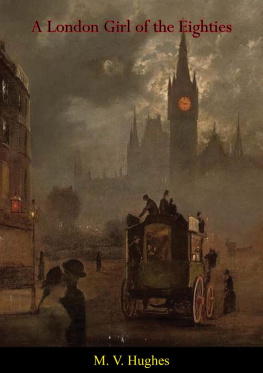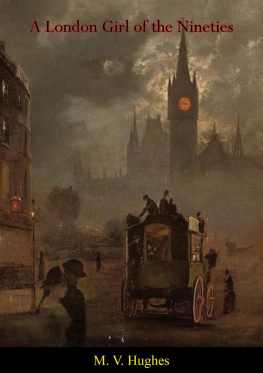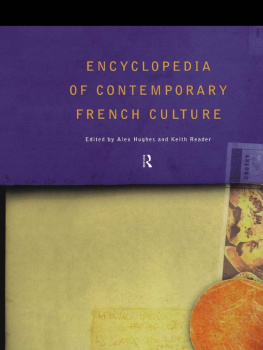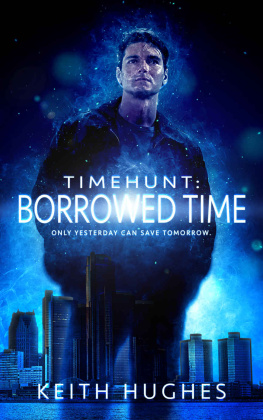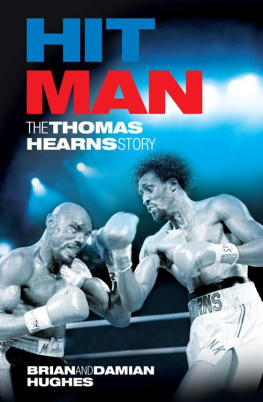This edition is published by BORODINO BOOKS www.pp-publishing.com
To join our mailing list for new titles or for issues with our books borodinobooks@gmail.com
Or on Facebook
Text originally published in 1934 under the same title.
Borodino Books 2018, all rights reserved. No part of this publication may be reproduced, stored in a retrieval system or transmitted by any means, electrical, mechanical or otherwise without the written permission of the copyright holder.
Publishers Note
Although in most cases we have retained the Authors original spelling and grammar to authentically reproduce the work of the Author and the original intent of such material, some additional notes and clarifications have been added for the modern readers benefit.
We have also made every effort to include all maps and illustrations of the original edition the limitations of formatting do not allow of including larger maps, we will upload as many of these maps as possible.
A LONDON CHILD OF THE SEVENTIES
by
M. V. Hughes
PREFACE
NONE of the characters in this book are fictitious. The incidents, if not dramatic, are at least genuine memories. Expressions of jollity and enjoyment of life are understatements rather than overstatements. We were just an ordinary, suburban, Victorian family, undistinguished ourselves and unacquainted with distinguished people. It occurred to me to record our doings only because, on looking back, and comparing our lot with that of the children of today, we seemed to have been so lucky. In writing them down, however, I have come to realize that luck is at ones own disposal, that there is nothing either good or bad but thinking makes it so. Bring up children in the conviction that they are lucky, and behold they are. But in our case high spirits were perhaps inherited, as my story will show.
DON PEDRO. In faith, lady, you have a merry heart.
BEATRICE. Yea, my lord; I thank it, poor fool, it keeps on the windy side of care.
I. A Star Danced
A GIRL with four brothers older than herself is born under a lucky star. To be brought up in London, in the eighteen-seventies, by parents who knew how to laugh at both jokes and disasters, was to be under the influence of Jupiter himself.
This fell to my lot. My early memories run from 1870, when we moved into a big house in Canonbury, until 1879, when my happy childhood was abruptly ended. I hope to show that Victorian children did not have such a dull time as is usually supposed.
It is true that we had few toys, few magazines, few outside entertainments, and few means of getting about. But we got so much out of the few we had, by anticipation, by saving up, by exhaustive observation of the shop windows, and by the utmost use of the things we did achieve, that the well-to-do child of today can never get the same kind of pleasure. The modern ready-made well-stocked farm-yard, stable, or railway station, after a few days admiration, asks for nothing but destruction, for there is nothing else to do about it.
For us, a large box of plain bricks was the foundation of all our doings. It served for railway stations, docks, forts, towers, and every kind of house. Another box of bricks, thin and flat with dove-tailed edges, enabled us to build long walls around our cities. Some two dozen soldiers, red for English and blue for French, mostly wounded and disarmed, carried out grand manuvres on specimens of granite and quartz arranged on the mantelpiece, and were easily mobilized anywhere. A packing-case did for a shop, where goods of all kinds were sold for marbles or shells or foreign stamps. The whole room was occasionally the sea, where a chair turned upside down was the Great Eastern, well and truly launched on the floor, for laying the Atlantic cable. A fat Lemprires Dictionary did for a quay or a transport wagon or an enemy town.
We had several remains of ninepins, and plenty of marbles. I loved the colours of the marbles and furtively collected them. Their relative merits I knew, and how to prize a blood alley; but learn to play I never could, preferring to flick or throw the marble, instead of using the thumb in the masterly way that the boys insisted on.
A new toy was an event. Each one of our well-worn treasures must have made a sensation when it first arrived. One such event is graven on my memory. It was my fifth birthday, and I got up early and ran into my parents room to be greeted. Laid out on the floor was a large and resplendent horse and cart. The horse was dapple-grey, all prancing and eyeing me in a friendly, willing way. The bright yellow cart, whose new stickiness I can still feel, had a movable back-piece that you could do something with. It would take off, and if you moved a wooden pin the cart tipped up; then you said gee-up to the horse and all the goods would fall out. I had seen it done in the street, and promised myself no end of pleasure carting bricks for the boys.
Whether by design or not, we were allowed almost unlimited freedom, to imperil our lives without any sense of fear, and to invent our own amusements. We never had a nurse, or a nursery, or any one to supervise us. Instead of this we were given a room to ourselves all to ourselves. In this matter we were better off than any other children we knew then or have known since. For our parents did the thing thoroughly. They provided a large table, a warm carpet, a fire whenever we liked, a large ottoman for storage and to serve as a window-seat; and left everything else to us. We chose the wallpaper and put what pictures we liked on the walls.
This room, which became a happy memory for us all through our lives, was called the studyperhaps as a hint of its intention. The name added to its dignity without putting, as far as we were concerned, any notion of work into it. As time went on we did our home lessons in it, but the word study is always associated in my mind with sheer fun.
So greatly was our possession of the study respected that I cannot remember my father or mother ever being in it, except on the occasions when they sat in the stalls during one of our theatrical displays, paying heavily for the privilege and for the programmes.
In one recess of the study there were four shelves, and by common consent each boy had one to himself. On his shelf he displayed his treasures. I remember the awe with which I gazed at my second brothers box of mathematical instruments, with bright compasses fitted into blue velvet grooves, and an ivory ruler that shifted into two for some strange purpose. He also had a big magnifying glass, which I always imagined had to be used when one magnified the Lord in church. Some geological specimens were also displayed, but seemed to me of no use except for building forts.
My third brother, Charles, had quite other tastes. He was all for colour and variety, and one never knew what he would do next. At one time he had a rage for churches, and used to visit all the places of worship in the neighbourhood to see what they did. Then he arranged a cross and candles and flowers on his shelf, and got bits of coloured silk from mother to make the correct liturgical changes, and I thus early learnt to expect purple in Lent, green for Trinity, and so on, and was able to impress many an elder who had really never noticed.




